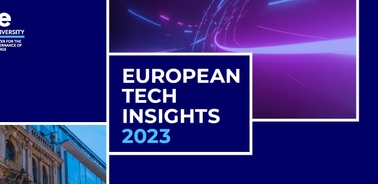- Home
- News And Events
- News
- Survey Reveals That 68% Of Europeans Want Government Restrictions On Ai
Survey reveals that 68% of Europeans want government restrictions on AI

The 2023 edition of European Tech Insights, our annual survey on European attitudes towards technological change, reveals a significant trust on the European Union to regulate Artificial Intelligence.
This year’s report reveals that 68% of Europeans want government restrictions on AI to protect jobs. This view has spiked by 18% in the continent within a year, possibly due to the introduction of popular Generative AI tools (ChatGPT, BART, Midjourney), rising from 58% in 2022 to 68% in 2023. In some countries, this increase has been considerable (Sweden +50,2%, UK +40,75, or Italy +34,9%).
Europeans express concerns over the negative economic and social externalities of the data economy and the fast adoption of AI in the workplace and beyond.
In a rapidly evolving technological landscape, Europeans’ stance on various tech-related issues has come under the spotlight. The data reflects a continent that largely supports EU involvement in implementing technological regulation.
– 44% of Europeans trust the European Union more than their own countries and corporations to regulate Artificial Intelligence (AI)
– The United Kingdom is the only country where a majority (51%) trust their government more than the EU to regulate AI.
European citizens’ priorities become evident in this report as they emphasize safety over data privacy, although there is a gender disparity in the findings:
– Amid the Israel-Gaza conflict, a majority of Europeans (60%) are willing to give away their privacy rights by sharing their data with governments and companies to combat global threats such as terrorist attacks.
– Only in Italy (53%) and Estonia (52%) a slight majority of their citizens refuse to share personal data to combat global threats.
– Women are more reluctant to share their personal data compared to men (55% versus 65% respectively).
The report also looks into attitudes about using AI for medical diagnoses and appetite regarding cyber enhancements and gene editing.
There is a tangible sense of hope, particularly regarding the healthcare applications of technology, where scientists are using biotech advancements to save lives.
– The majority of Europeans (58%) believe that gene-editing technology will be positive for humankind and bring positive outcomes.
– A third of the continent’s citizens (34%) would be willing to get a brain implant to augment cognitive abilities. This sentiment reaches nearly half of the population in Sweden (49%), Poland (47%) and Romania (46%).
– 18% of Europeans would trust an analytical diagnosis by an AI system more than an observational one from a human doctor. This percentage increases to 27% in Sweden and 25% in Romania.
The report also reveals the European responses to the EU’s recent warning against using TikTok due to privacy concerns:
– A third of EU citizens (33%) are willing to continue using apps that may pose a risk for their privacy, even if the EU advises against using them.
– The prioritization of privacy tends to increase with advancing age, as 76% of those above 75 years old would uninstall the app.
The European Tech Insights 2023 survey was conducted in August 2023. In this study, the CGC collected responses from 3,003 adults across 10 countries: the United Kingdom, Estonia, France, Germany, Italy, the Netherlands, Poland, Romania, Spain and Sweden. The samples maintained a representative balance in terms of age, gender, region and education.

